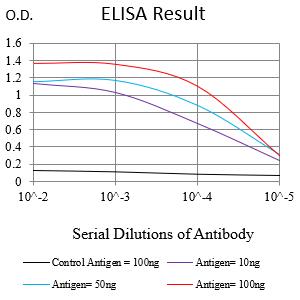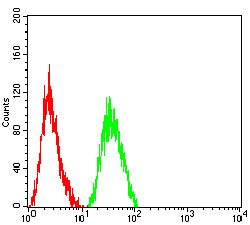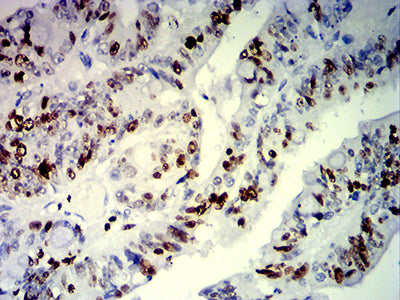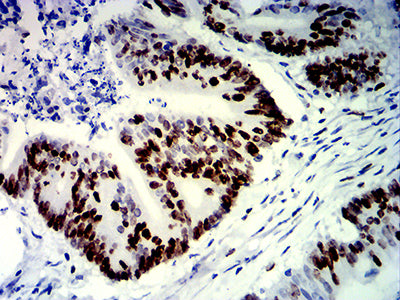



| WB | 咨询技术 | Human,Mouse,Rat |
| IF | 咨询技术 | Human,Mouse,Rat |
| IHC | 1/200 - 1/1000 | Human,Mouse,Rat |
| ICC | 技术咨询 | Human,Mouse,Rat |
| FCM | 1/200 - 1/400 | Human,Mouse,Rat |
| Elisa | 1/10000 | Human,Mouse,Rat |
| Aliases | KIA; MIB-; MIB-1; PPP1R105 |
| Entrez GeneID | 4288 |
| clone | 7B12B1 |
| WB Predicted band size | 35.9kDa |
| Host/Isotype | Mouse IgG1 |
| Antibody Type | Primary antibody |
| Storage | Store at 4°C short term. Aliquot and store at -20°C long term. Avoid freeze/thaw cycles. |
| Species Reactivity | Human |
| Immunogen | Purified recombinant fragment of human MKI67 (AA: 1160-1493) expressed in E. Coli. |
| Formulation | Purified antibody in PBS with 0.05% sodium azide |
+ +
以下是关于MKI67抗体的3-4篇参考文献的简要信息:
1. **文献名称**:*The Ki-67 protein: from the known and the unknown*
**作者**:Scholzen T, Gerdes J (2000)
**摘要**:总结了Ki-67(MKI67)蛋白在细胞增殖中的作用,包括其在不同细胞周期阶段的表达模式、功能研究及作为增殖标志物的临床应用。
2. **文献名称**:*Comparison of antibodies against the Ki-67 antigen MIB-1 and SP6 in breast cancer*
**作者**:Yerushalmi R et al. (2010)
**摘要**:比较了两种常用抗MKI67的抗体(MIB-1和SP6)在乳腺癌组织中的染色一致性,结果显示两者在评估增殖指数时具有高度相关性,但染色强度存在差异。
3. **文献名称**:*Assessment of Ki-67 as a prognostic marker in breast cancer: issues of methodology and clinical utility*
**作者**:Andreassen T et al. (2016)
**摘要**:探讨了MKI67抗体在乳腺癌预后评估中的应用,分析了标准化检测方法的必要性及不同实验室间结果变异性的挑战。
4. **文献名称**:*Ki67 immunostaining in pathological practice: a survey of current clinical research objectives*
**作者**:Bussolati G et al. (2008)
**摘要**:提出MKI67抗体在肿瘤病理诊断中的标准化建议,强调抗体选择、染色评分标准对结果可重复性的重要性。
(注:以上信息为示例性内容,实际文献可能存在差异,建议通过学术数据库核实。)
The MKI67 antibody is a crucial tool in biomedical research and diagnostics, targeting the Ki-67 protein encoded by the *MKI67* gene. Ki-67 is a nuclear antigen expressed in all active phases of the cell cycle (G1. S, G2. and M) but absent in quiescent (G0) cells, making it a well-established marker of cellular proliferation. Discovered in the 1980s, Ki-67’s dynamic expression pattern has led to its widespread use in assessing tumor growth fractions. In clinical practice, MKI67 antibodies are primarily employed in immunohistochemistry (IHC) to quantify proliferating cells within tissue samples, aiding in cancer grading, prognosis prediction, and therapeutic response evaluation. For example, high Ki-67 indices in cancers like breast carcinoma or lymphoma often correlate with aggressive behavior and poorer outcomes.
Common clones, such as MIB-1. are widely utilized due to their compatibility with formalin-fixed, paraffin-embedded tissues. However, variability in staining protocols and interpretation criteria can affect result reproducibility, highlighting the need for standardization. While Ki-67 is a cornerstone proliferation marker, it is often compared to alternatives like PCNA or mitotic counts. Recent studies also explore its role beyond oncology, including regenerative medicine and infectious diseases. Despite limitations, the MKI67 antibody remains indispensable in understanding cell dynamics and guiding clinical decisions.
×